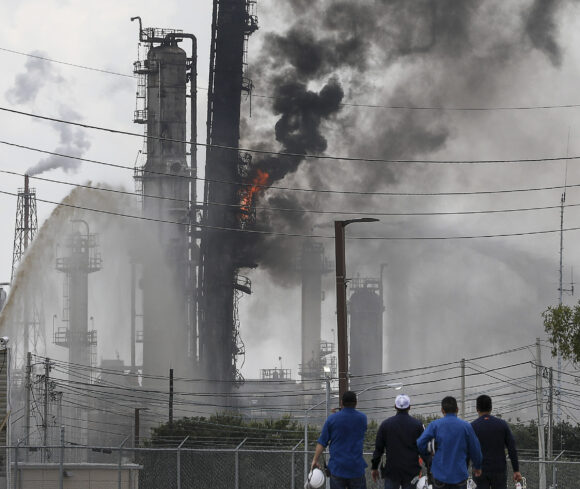Medical providers who treated patients injured by a fire and explosion at an ExxonMobil chemical plant near Houston must disclose information about what they charged others for the same services, The Texas Supreme Court ruled.
In an unsigned opinion released Friday, the high court overturned decisions by the trial court and the 14th District Court of Appeals. The lower courts had found that ExxonMobil’s discovery request put an undue burden on medical providers who had provided services in exchange for a promise — called a letter of protection — that they would be paid out of the proceeds of any lawsuit.
“The denied discovery was necessary to develop a defense that goes to the heart of ExxonMobil’s case—that the providers’ rates were unreasonable,” the opinion says.
The Supreme Court in May issued a similar ruling in another case, titled In re K & L Auto Crushers. The court overturned rulings by the trial court and the Court of Appeals in Dallas that blocked a discovery request by a defendant in a personal injury suit.
The ExxonMobil case came before the Supreme Court after a July 2019 explosion at the company’s olefins plant in Baytown, Texas that injured 66 people, according to local media reports. Nearly 60 lawsuits were filed by employees of contractors who were working at the plant seeking more than $1 billion in damages, according to court documents.
ExxonMobil sent subpoenas to medical providers who treated the plaintiffs, but District Court Judge Daryl Moore in Houston denied the company’s motion to enforce them. A split panel with the 14th Court of Appeals in Houston affirmed the trial court’s decision.
ExxonMobil appealed to the Supreme Court.
The U.S. Chamber of Commerce and tort-reform groups filed an amicus brief arguing that if defendants in lawsuits are not allowed to conduct discovery to learn whether medical bills are reasonable, plaintiffs attorneys will be able to inflate the amounts recovered. The potential for exaggerated damages is even worse when punitive damages are awarded because they cost the defendant twice the amount of the actual damages.
Attorneys for the Chamber said that typically medical providers who have signed letters of protection will ask for the “chargemaster” rate, which isn’t what they are actually paid by other patients or their insurers but merely stands as a baseline for negotiations.
“Absent evidence, obtained through discovery, of the providers’ actual charges for the relevant types of service, jurors are misled into believing that chargemaster rates reflect a plaintiffs’ actual losses,” the brief says. “This results in higher verdicts than would otherwise be appropriate, resulting in a windfall to plaintiffs and their counsel.”
The Texas Civil Justice League made similar arguments in a separate amicus brief. “By refusing relevant discovery, this trial judge has put a very heavy finger on the scale of justice in this case and exposed a civil defendant to potential liability for excessive damages not actually incurred by the claimants,” the brief says.
The plaintiffs in the ExxonMobil case argued that the company’s discovery request sought irrelevant information, were overly burdensome and would require disclosure of trade secrets and confidential information.
The Supreme Court, however said that ExxonMobil had narrowed its discovery request after the 14th District Court of Appeals ruled that a discovery request for medical provider information made in a separate case was overbroad. ExxonMobil dropped eight out of 18 deposition requests and 14 out of 26 document requests in order to conform to the appellate court’s ruling, the Supreme Court said.
The opinion says the trial court abused its discretion by failing to grant ExxonMobil’s request to enforce its more carefully tailored request for documents. The court found that the decision left ExxonMobil no adequate remedy on appeal.
“While the providers are not parties to this suit—a relevant fact when considering whether discovery requests present an undue burden, our rules expressly authorize discovery of relevant information from nonparties,” the opinion says. “And here, the letters of protection under which the providers have secured a financial interest in the resolution of these claims offset the providers’ nonparty status when balancing the burdens and benefits of discovery.”
About the photo: Flames and smoke rise after a fire started at an ExxonMobil facility, Wednesday, July 31, 2019, in Baytown, Texas (Jon Shapley/Houston Chronicle via AP)
Was this article valuable?
Here are more articles you may enjoy.


 Tesla’s Austin Robotaxis Report 14 Crashes in First Eight Months
Tesla’s Austin Robotaxis Report 14 Crashes in First Eight Months  AI Got Beat by Traditional Models in Forecasting NYC’s Blizzard
AI Got Beat by Traditional Models in Forecasting NYC’s Blizzard  NYC Travel Snarled by Snow as Central Park Gets 15 Inches
NYC Travel Snarled by Snow as Central Park Gets 15 Inches  Judge Upholds $243M Verdict Against Tesla Over Fatal Autopilot Crash
Judge Upholds $243M Verdict Against Tesla Over Fatal Autopilot Crash 